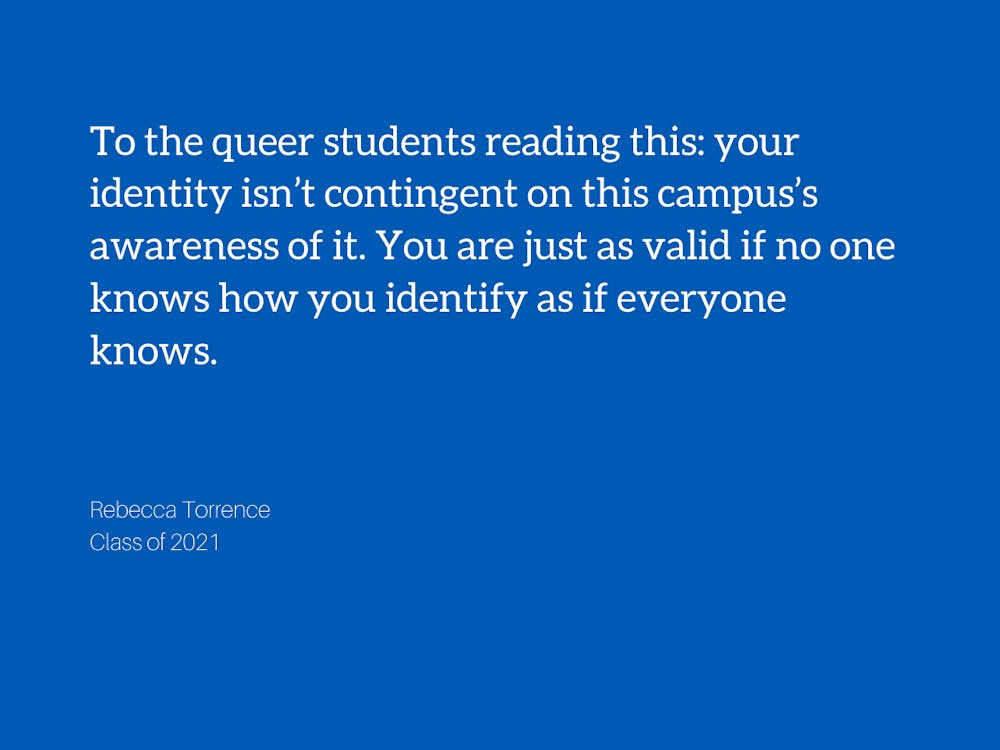Given that Duke boasts a generally progressive and accepting environment, there’s an expectation here that all queer students feel safe enough to come out. But when you possess a marginalized identity, feelings of safety rarely come naturally.
Last week, a friend I’ve known for three years came out to my religious group. It had been a while since I last heard someone come out. I, too, had taken Duke’s assumed openness for granted, guessing that pretty much every queer person on campus was already out. This friend’s vulnerable admission made me realize just how wrong I was.
Coming out was definitely easier at Duke than in my conservative Tennessean hometown, but it still wasn’t easy. While I was excited to begin a new chapter of my life where I could finally be unapologetically myself, I was also completely terrified of what that life might look like. Acknowledging my sexuality out loud remained a daunting, even distressing task. And it felt like a task, too—like I had to dive headfirst into the LGBTQ+ community for my experiences to be validated.
Yet to my dismay, the conservative, Christian, homophobic context I’d existed within for eighteen years continued to permeate my sense of self-realization. While I probably didn’t have much reason to be nervous about coming out at Duke, I’d spent most of my life with plenty of reason to be nervous. And those anxieties don’t just go away because you think they’re supposed to.
The contexts within which we learned to feel ashamed of our identities aren’t altogether absent at Duke, either. Despite Duke’s majority-liberal environment, there are plenty of groups, like conservative clubs, religious life, or even ROTC, whose national affiliations have extensive histories of homophobia. Greek organizations were founded on and continue to be perpetuated by heteronormative practices. Queer people of color, especially women and non-binary people, face particular discrimination in American society as well as underrepresentation in queer spaces, where white men dominate—and these challenges don’t disappear once you hit Chapel Drive. Just because Duke is ahead of the curve in some areas doesn’t mean everyone here automatically scores a 100.
These battles aren’t merely waged between queer identities and the institutions that silence them, however. For many queer people, the biggest battle is the one they fight in their own heads. Not only are there queer people here hiding their identities, there are also those still struggling to figure out what those identities are. Especially for the students who were raised to repress their sexuality or who also experience heterosexual attraction, coming out can be a much longer and more confusing process than the rest of us might normally expect. This process of self-discovery can feel very isolating, especially when it seems like everyone else on campus has it all figured out.
Spoiler alert: we don’t have it all figured out. Hell, I still get nervous talking about my sexuality—and writing about it—even though I continue to choose to make my story public. Coming out does get easier every time you do it. But each and every time you come out is an act of bravery.
To the queer students reading this: your identity isn’t contingent on this campus’s awareness of it. You are just as valid if no one knows how you identify as if everyone knows. Of course, I want to encourage you to pursue self-realization, and I believe there are plenty of people here who can help you accept yourself exactly as you are. I like to think I’m one of them. But you don’t owe this community anything—not a perfectly crafted coming out story, nor a label to go with it.
And we, as a community, must do better to understand the diversity of experiences of queer students at Duke. We have no right to make judgments about anyone’s sexuality, nor to assume we have the right to know how a person identifies. I don’t want to hear another “he’ll come out eventually” or “if she was going to experiment, she would’ve done so already.” These statements make it even harder for the subject of your appraisal to accept their sexuality, regardless of whether they’re straight or not. Your well-intentioned gossip isn’t so innocent when you put an individual’s identity at stake.
Coming out vlogs and one-dimensional queer TV characters have diffused the idea that, for a queer person, coming out is the final step in the process of achieving self-acceptance. This isn’t true. In fact, coming out isn’t a single step, but hundreds of steps you take throughout your lifetime—the first time you admit your sexuality to yourself, the first conservation you have about your identity, the first rainbow flag you own, the first crush of the same gender that you tell your friends about. Those steps may vary wildly between people, as may the time frames in which they occur. But all identities, and the experiences that underlie them, are valid—no matter how they compare to our ideas of what sexuality is “supposed” to look like.
So whether you’re still in the closet or a loud and proud queer advocate, know that this community is ready to accept you with open arms. We’re ready today, and we’ll be ready in ten years. But if and when you do come out, don’t do it for us. Do it for yourself.
Rebecca Torrence is a Trinity junior. Her column runs on alternate Thursdays.
Get The Chronicle straight to your inbox
Signup for our weekly newsletter. Cancel at any time.

